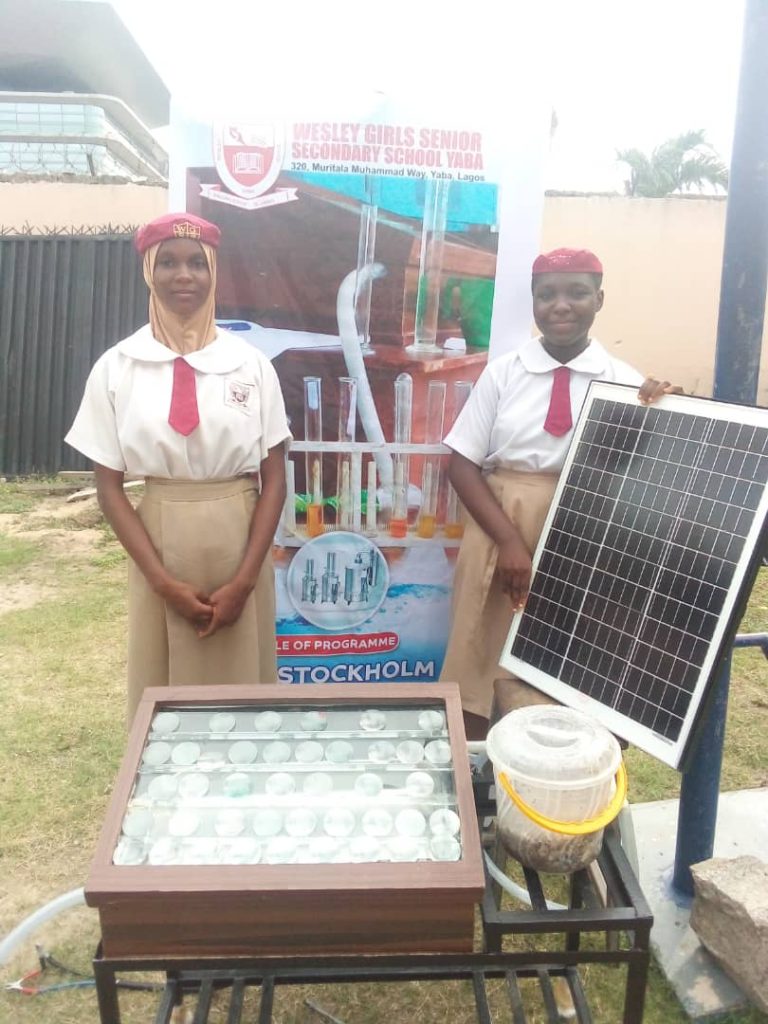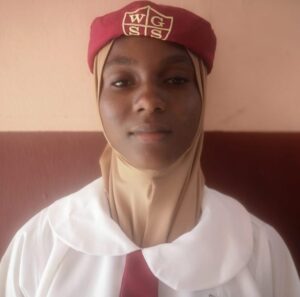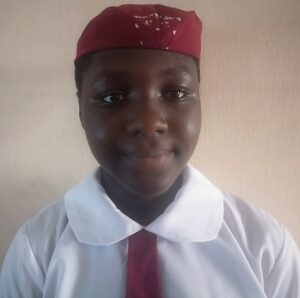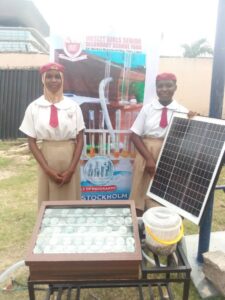
One of the highlights of the World Water Week, a yearly event organized by the Stockholm International Water Institute (SIWI) is the Stockholm Junior Water Prize (SJWP) which empowers young people to solve water issues through an international competition.
Part of this year’s 31 finalists are Hajara Abdulsalam Omotunde and Elizabeth Koloro Babatunde, students of Wesley Girls Secondary School Yaba, Lagos State. The duo is representing Nigeria to present a project centered around a Bithernal Distillation Device, which uses solar energy to purify water.
eWASH’s -Babatope Babalobi and Emmanuella Solomon spoke to Godwin Chinaemerem, the National Organizer of the SJWP on the chances of the students clinching the coveted junior water prize, which no Nigerian has won for 26 years.
What is the 2023 Stockholm Junior Water Prize about, and why is Nigeria participating?
The Stockholm Junior Water Prize is an annual competition where students between the ages of 15-20 years are expected to submit their innovative projects which try to solve water and environmental problems. In Nigeria, at the beginning of each year’s competition, we write to different state ministries of education to ask their students to participate in the competition.

This year, we also sent invitations to state commissioners

of education and got a total of 60 entries from different states in the country. In May this year, we had the national finals at the Embassy of Sweden in Abuja. In the competition, we have members of the panel of jury, which are the people who make decisions on the best project presented and who should represent the country in the international finals in Stockholm.
What is the name of the group coordinating and facilitating this competition, and how long have you been coordinating it in Nigeria?
The name of the group is Hope for Africa through Sustainable Development. We have been coordinating it for the past three years.
What does Nigeria stand to benefit as a nation and for the students partaking in it?
- They stand to benefit a lot, and one of it is a broader network of like-minded water professionals. Our finalists meet in Stockholm to rub minds with their colleagues from other parts of the world and more advanced countries.
- They can also get scholarships because they may meet organizations who are interested in their projects or research mentors interested in bringing them into their faculty to develop their projects. There have been records of countries having that opportunity, so it’s a great platform for them.
- They also create an international WhatsApp group for the finalists so they can keep communicating and sharing ideas to see how they can help themselves get better.
At the international level, what is the prize money for the winner? Was there any prize money for the Nigerian finalists?
For this year, we got poor funding. Previously the plan was to give cash prizes to the winners. However, maybe because of the change of Government at this time, we had challenges with funding, so we only had the embassy host the event, and that was all. However, hopefully, when we get more funds, we will contact the winners.
For the international level, what was the prize?
It should be around 15,000 dollars. I’m not very sure, but the details are on the Stockholm Junior Water Prize website. There are three award categories:
- The first is the Stockholm Junior Water Prize, which is the highest prize where the winner gets a plaque and 15,000 dollars.
- The second is the Diploma of Excellence, given to the project which tries to solve a unique problem.
- The third one is The Peoples Choice Awards determined by the people, in which people vote for the competing candidates.
Any candidate that has the highest number of votes wins that award category. The Peoples Choice Awards is on now, so people are expected to vote until the 15th of August 2023. https://siwi.org/stockholm-junior-water-prize/vote#slide11107
We are also advocating that people vote for the Nigerian representatives to win this year’s award.
What is the motivation of your organization in doing this?
That’s a very good question because you need motivation to do a project like this. Well, the major motivation is to see Nigerian students try to solve environmental problems using the resources they see around them. To encourage students to investigate the environment, identify challenges and try to fix them. That’s the major thing to stimulate the students to see what they can invent to solve water, flood, and pollution challenges in the society.
What have been the experiences of Nigerian students in the past three competitions?
The event goes with World Water Week, so you see them participate in discussions, networking, making contacts and having fun and then come back to impart the knowledge they’ve gathered. There has never been an issue of them trying to run away. In the years I’ve been organizing the event, I’ve seen the students holding the nation’s name in high esteem. The Stockholm Water Prize company respects Nigeria so much because of the level of comportment our people show.
We even have a case where a student reported a missing purse to the authorities, so I must commend Nigerians that have been going; they’ve been wonderful and really made Nigeria proud; it’s not what you see in the media. So, each time we approach the embassy for the visa, they don’t hesitate because the track record has been there.
Who sponsors the winner’s trip?
It’s the Governor of the state. For every state that wins, we reach out to the Governor to tell them their students have won and that they need to sponsor them to Sweden. Of course, the Governors will always be happy to hear that because it makes the state proud to get their indigenes to the stage of representing the country at the international level.
Tell us about the Wesley Girls project that won in Nigeria; what is their project all about?
It is a project that tries to use solar energy to treat contaminated water called the Biothermal Water Distillation Device. In Nigeria, we have a lot of solar energy available, and considering the students location in the Makoko area of Lagos state, which has a lot of polluted water. So, they tried to harness solar energy to free their water from contaminants. To get more information on their project, you can check The Stockholm Junior Prize Peoples Award web site because they made a video clip summarizing the project there. When you check it, please vote, and share it among your network that people should vote the Nigerian students.

We did a background check of the Stockholm Junior Water Prize International finals, and it showed that no Nigerian School had ever won it. So, what will you attribute to that?
There are so many attributes to it.
- One is that we don’t invest in our education system. To do quality projects such as these, we need funding.
- Also, I discovered that developing countries do more of practical based education system than theoretically based. Over there, children in primary schools are already able to apply scientific theory to their daily lives. But here we are still trying to cram Charles Law, unable to relate it to real-life situations. So, the quality of education goes a long way.
- There was a project from a secondary school girl in Canada in 2019, the project that came first, she was able to harness solar energy so much that she just put a solar sticker on a container, and it was able to absorb energy from the sun and disinfect the water in that container. This was because she had access to labs and adequate funding to do research.
- So, the most important thing is that if Nigeria can make learning more practical than theoretical, it will go a long way in improving the standard of learning in the country.
So, are you hopeful that the story will be different this year?
Yes, we are hopeful, but we must also be intentional about achieving that. It must come from the Government down to the grassroots. It must be adequately funded. If you hear the amount of funding that these advanced countries pour into their education, you’ll think it’s a waste; however, on the contrary, the results are evident. If you come to Stockholm and have the opportunity to discuss with these students from advanced countries, you will be amazed. Each time I go there, I see the amazing projects they do and the simple methods they use to achieve such great results; I am in awe.
Are you looking forward to seeking funding from the private sectors for your students in the future?
Yes, I think partnering with the private sectors and bringing them in will be a good step. It’s very important to get funding for these students because sometimes, they have various ideas on what to do but will be restricted by the funding and research utilities, which makes the ideas die. I observed that the advanced countries give their students access to different labs and professors to rub minds about their ideas, which will guide them aright and help them develop reasonable projects. So, I think that’s the way we should go to get it right.
Leave a Reply